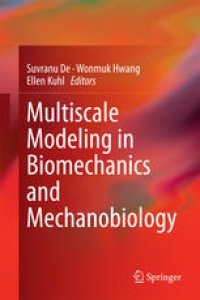
Ebook: Multiscale Modeling in Biomechanics and Mechanobiology
- Tags: Theoretical and Applied Mechanics, Biomedical Engineering, Mathematical and Computational Biology, Computer Appl. in Life Sciences
- Year: 2015
- Publisher: Springer-Verlag London
- Edition: 1
- Language: English
- pdf
Presenting a state-of-the-art overview of theoretical and computational models that link characteristic biomechanical phenomena, this book provides guidelines and examples for creating multiscale models in representative systems and organisms. It develops the reader's understanding of and intuition for multiscale phenomena in biomechanics and mechanobiology, and introduces a mathematical framework and computational techniques paramount to creating predictive multiscale models.
Biomechanics involves the study of the interactions of physical forces with biological systems at all scales – including molecular, cellular, tissue and organ scales. The emerging field of mechanobiology focuses on the way that cells produce and respond to mechanical forces – bridging the science of mechanics with the disciplines of genetics and molecular biology. Linking disparate spatial and temporal scales using computational techniques is emerging as a key concept in investigating some of the complex problems underlying these disciplines.
Providing an invaluable field manual for graduate students and researchers of theoretical and computational modelling in biology, this book is also intended for readers interested in biomedical engineering, applied mechanics and mathematical biology.
Presenting a state-of-the-art overview of theoretical and computational models that link characteristic biomechanical phenomena, this book provides guidelines and examples for creating multiscale models in representative systems and organisms. It develops the reader's understanding of and intuition for multiscale phenomena in biomechanics and mechanobiology, and introduces a mathematical framework and computational techniques paramount to creating predictive multiscale models.
Biomechanics involves the study of the interactions of physical forces with biological systems at all scales – including molecular, cellular, tissue and organ scales. The emerging field of mechanobiology focuses on the way that cells produce and respond to mechanical forces – bridging the science of mechanics with the disciplines of genetics and molecular biology. Linking disparate spatial and temporal scales using computational techniques is emerging as a key concept in investigating some of the complex problems underlying these disciplines.
Providing an invaluable field manual for graduate students and researchers of theoretical and computational modelling in biology, this book is also intended for readers interested in biomedical engineering, applied mechanics and mathematical biology.